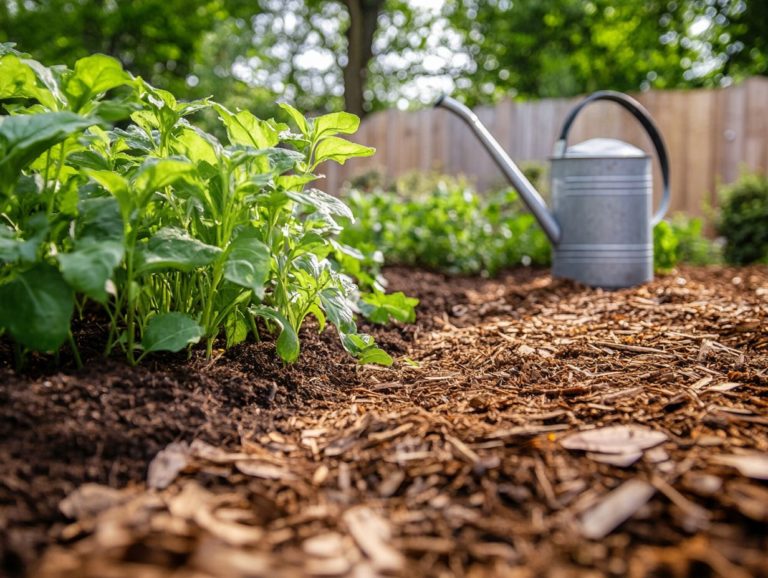The Importance of Water Conservation in Agriculture
Learn how you can contribute to water conservation in agriculture!
Water conservation in agriculture is essential for ensuring sustainable food production and protecting environmental health. As water scarcity continues to be a pressing concern, it s crucial for you to understand its role in crop production and the challenges that farmers encounter.
This article delves into the significance of water in agriculture, highlights the various obstacles to conservation efforts, and outlines the many advantages of adopting efficient practices. From innovative irrigation techniques to improved soil management, you ll discover practical strategies that can enhance yields and bolster global food security.
Join in as the article unpacks the vital role of water conservation in shaping a sustainable agricultural future!
Contents
- Key Takeaways:
- Understanding Water Conservation in Agriculture
- The Role of Water in Agriculture
- Challenges to Water Conservation in Agriculture
- Benefits of Water Conservation in Agriculture
- Strategies for Water Conservation in Agriculture
- Frequently Asked Questions
- What is the importance of water conservation in agriculture?
- How does water conservation benefit farmers?
- What are some water conservation techniques used in agriculture?
- How can water conservation in agriculture impact the environment?
- What are the challenges of implementing water conservation in agriculture?
- What can individuals do to support water conservation in agriculture?
Key Takeaways:
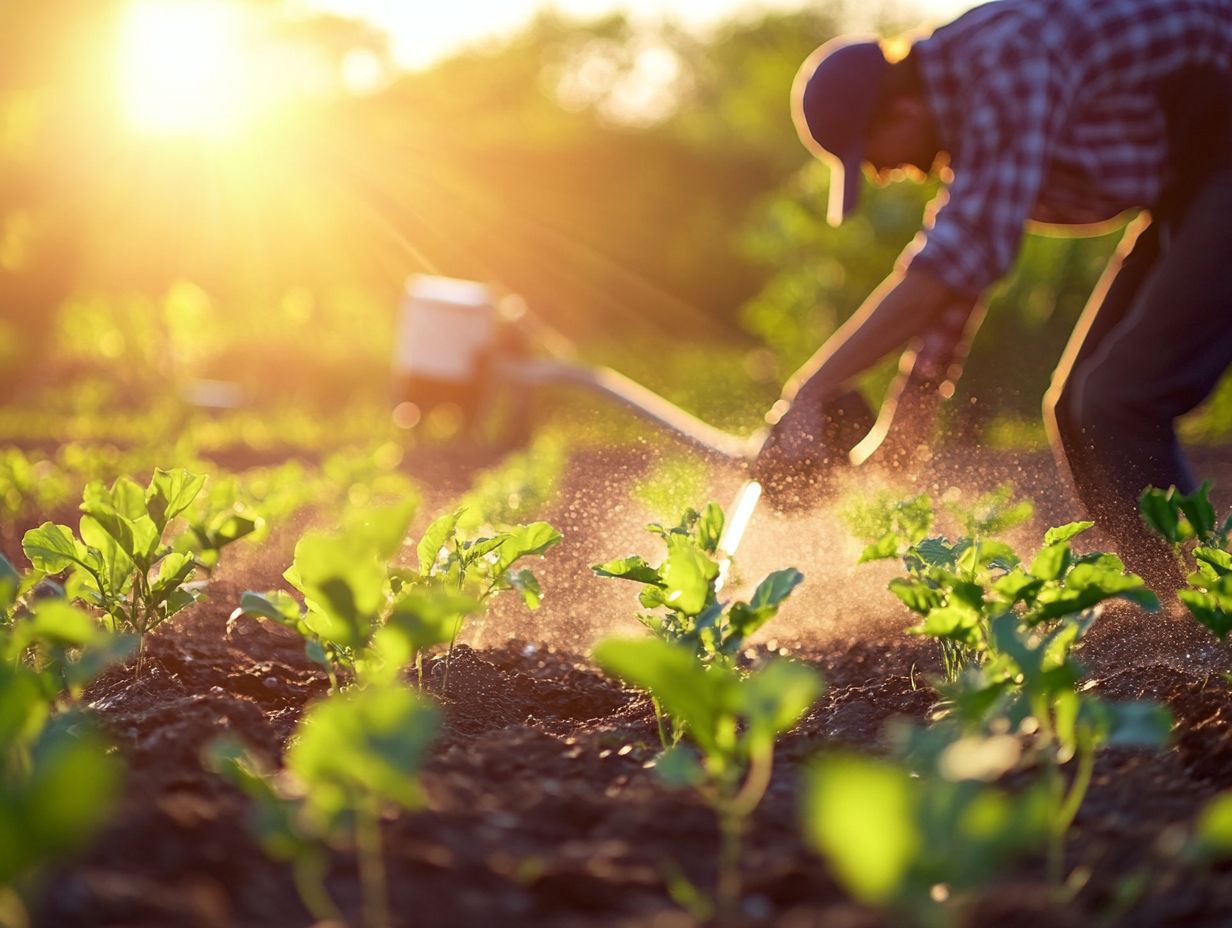
Water conservation is crucial in agriculture to ensure sustainable food production for our growing population. Efficient irrigation techniques and soil management practices are key strategies for water conservation in agriculture. Conserving water in agriculture has a positive impact on both the environment and the economy, making it a vital practice for the future of our planet.
Understanding Water Conservation in Agriculture
Understanding water conservation in agriculture is vital for achieving sustainable food production, particularly as climate change and decreasing freshwater resources pose significant challenges. It involves a diverse array of practices designed to optimize water use, benefiting both agricultural productivity and environmental well-being.
By adopting strategies like rainwater harvesting and careful farming techniques, you can improve water management and enjoy economic benefits.
This approach is essential not only for maximizing crop yields but also for tackling the urgent challenge of water scarcity that many regions face globally. Effective water management includes various irrigation systems, like drip and sprinkler irrigation, designed to minimize water wastage while delivering precise amounts directly to your crops.
Using sustainable methods like collecting rainwater and managing soil moisture can benefit everyone. Adopting these techniques allows you to significantly reduce your water footprint, foster resilience in your agricultural practices against climate variability, and secure food supply chains for generations to come.
The Role of Water in Agriculture
Water is critical in agriculture, acting not only as a primary resource for crop production but also as a crucial element that influences the sustainability and efficiency of your farming practices. In areas where fresh water is scarce, utilizing optimized irrigation techniques becomes essential for maintaining healthy crop yields and ensuring a stable food supply.
By adopting smart water use practices, you can significantly boost agricultural productivity, especially in the face of climate change and the increasing demand for food.
Water Usage and Importance in Crop Production
Water usage is essential to crop production, influencing everything from growth rates to the quality and quantity of your harvest from agricultural lands. By implementing efficient management practices, you can effectively harness water resources, which is crucial for optimizing crop growth and maximizing yields.
Careful irrigation techniques not only help conserve water but also ensure that your plants receive the right amount at the right time, leading to healthier crops. With advancements in yield mapping technologies, you can gain a deeper understanding of how water distribution impacts various areas within your field, ultimately enhancing your overall agricultural productivity.
Plus traditional methods, cultivating drought-resistant crops has become a sustainable strategy, providing resilience against unpredictable weather patterns while maintaining crop performance.
Water quality is very important. Impurities can significantly harm plant health, underscoring the necessity for stringent management practices to ensure clean water for irrigation.
Challenges to Water Conservation in Agriculture
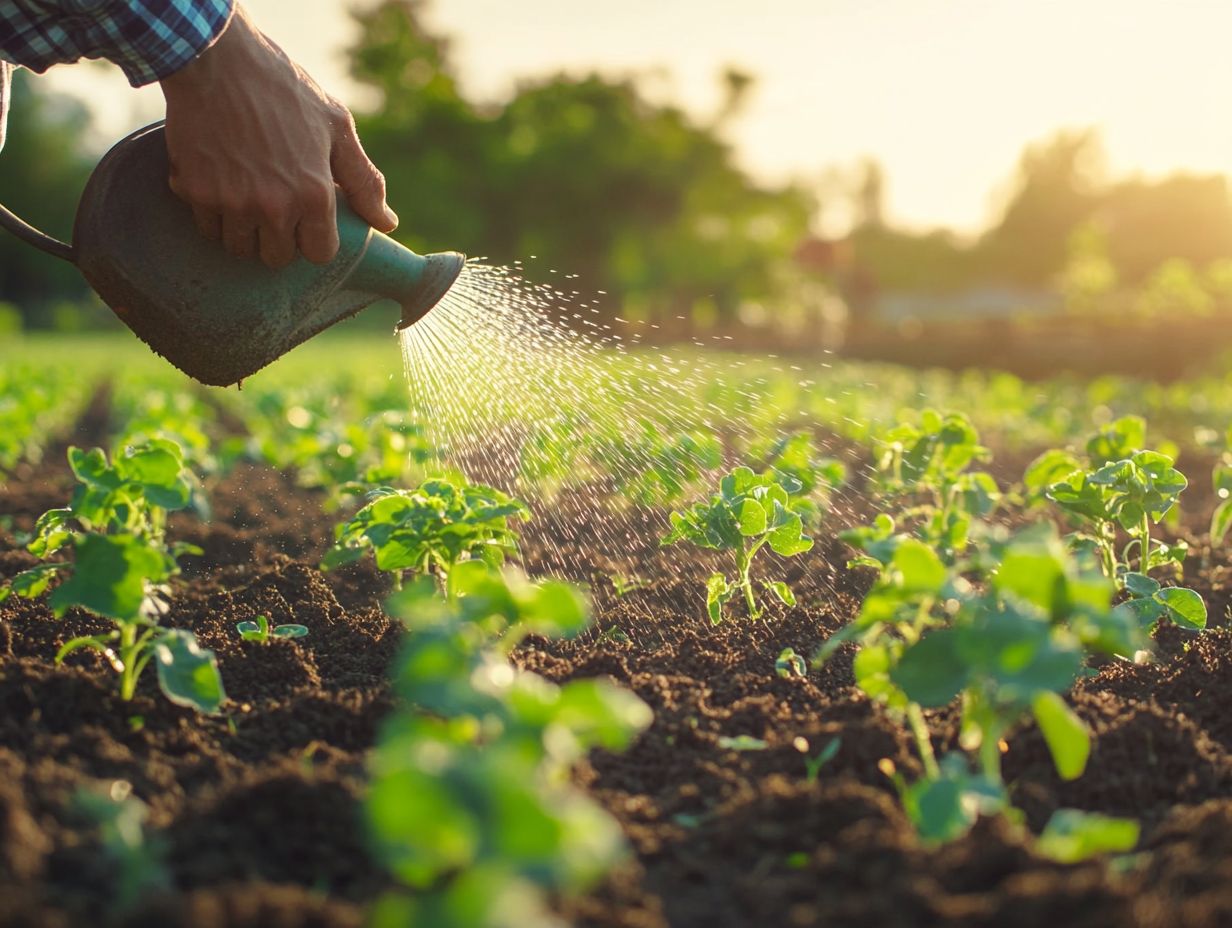
Challenges to water conservation in agriculture are complex. They often arise from a mix of environmental, economic, and technological factors that hinder the shift toward sustainable practices.
You ll likely face the impacts of climate change, which intensify water scarcity. Many farmers may lack the know-how to implement effective water management strategies.
Recognizing these barriers is crucial for crafting solutions that improve water security in agriculture.
Environmental and Economic Factors
Environmental and economic factors play critical roles in water conservation efforts. These elements often determine the feasibility of various sustainable practices.
For example, climate change is causing unpredictable weather patterns. This affects rainfall distribution and increases drought frequency, heightening the need for effective water management.
The depletion of groundwater makes things tougher and renders traditional irrigation methods less effective. You must weigh the economic implications of adopting innovative technologies like drip irrigation, which delivers water directly to plant roots.
While these solutions can lead to long-term savings, the initial investment may be high. This creates a challenge for many, especially in areas with limited funding access.
Benefits of Water Conservation in Agriculture
Imagine a future where every drop of water is used wisely that’s the power of water conservation in agriculture! The benefits go beyond just saving water; they include economic and environmental advantages vital for sustainable food production.
By adopting efficient irrigation techniques and sustainable practices, you can boost crop yields and improve soil quality. This minimizes water runoff and enhances overall water security.
These benefits are key to addressing the challenges posed by climate change and water scarcity.
Impact on Sustainability and Resource Management
Water conservation enhances sustainability in agriculture. It enables you to adopt better resource management practices that are vital for long-term success.
By implementing effective water conservation measures, you maximize every drop, boosting crop yields while cutting waste.
Techniques like crop monitoring help you track soil moisture levels. This allows for informed decisions on when and how much to irrigate.
With proper irrigation scheduling, you conserve water and optimize plant growth conditions, leading to healthier crops.
These practices support environmental sustainability while also improving the economic viability of farms. Together, they help create a resilient food supply capable of withstanding climate changes.
Strategies for Water Conservation in Agriculture
Now is the time to implement effective water conservation strategies! They are essential for addressing urgent water scarcity and climate challenges while boosting agricultural productivity.
Consider adopting innovative irrigation techniques, like drip irrigation, or refining crop management practices that focus on soil moisture retention.
By embracing these approaches, you ll not only protect vital water resources but also ensure economic stability, paving the way for a sustainable future in agriculture.
Efficient Irrigation Techniques and Technologies
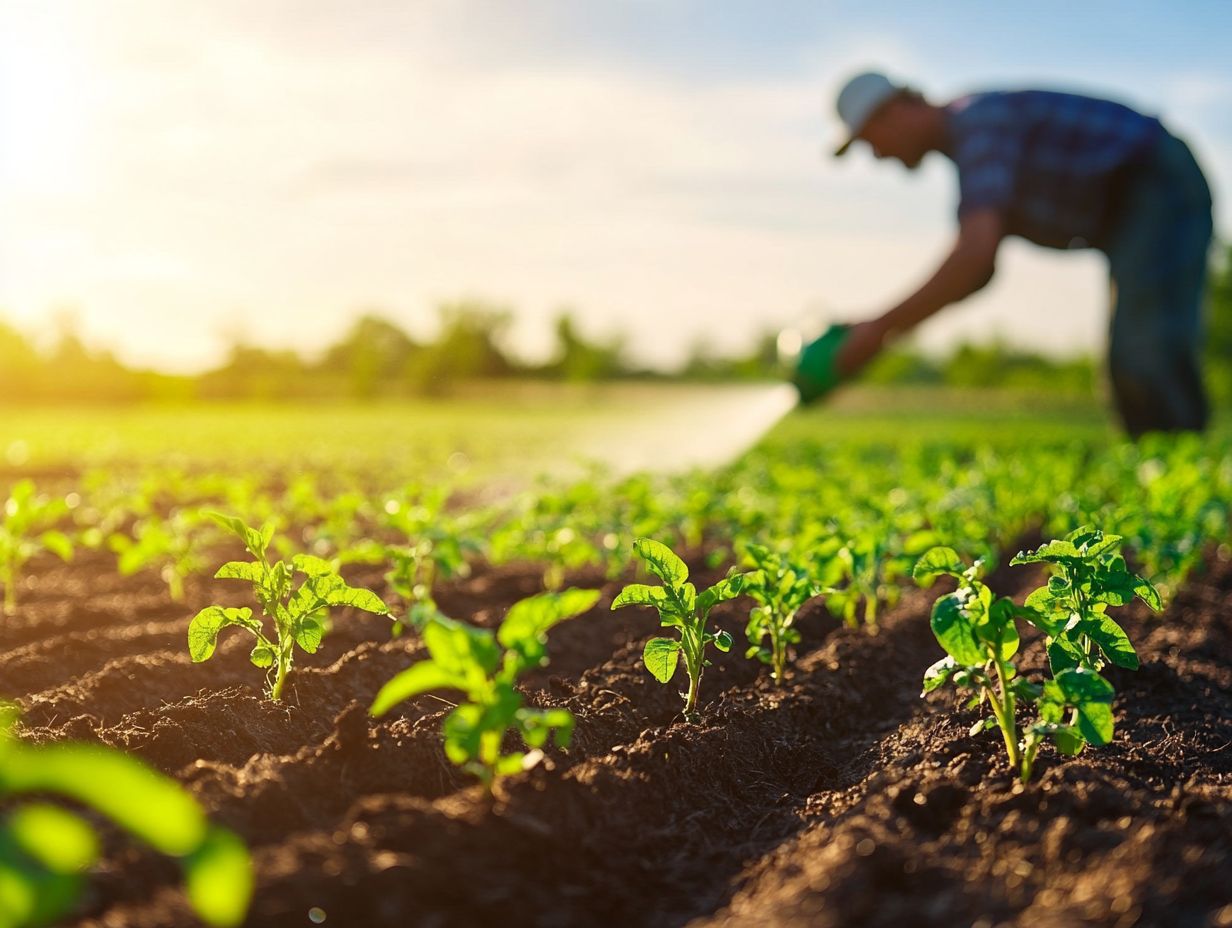
Efficient irrigation techniques and technologies are essential for water conservation in agriculture. These practices enable you to maximize water use efficiency and minimize waste.
Consider furrow irrigation, where shallow trenches guide water directly to your crops. This method ensures each plant receives the moisture it craves without excess runoff.
Laser leveling technology enhances field slopes to create an even surface. This allows water to distribute uniformly across your land, significantly reducing evaporation loss.
Smart irrigation technologies take things a step further by leveraging sensors and data analytics to monitor soil moisture levels and weather conditions. This means you can deliver the right amount of water exactly when it’s needed.
Adopt these innovative practices today for a boost in agricultural productivity while managing your precious water resources responsibly.
Soil and Crop Management Practices
Soil and crop management practices are vital to your water conservation efforts in agriculture. They directly impact both water retention and crop resilience.
Incorporating strategies like cover cropping significantly enhances soil structure and boosts organic matter, leading to improved moisture retention.
Utilizing compost mulch serves as a protective barrier that minimizes evaporation. This ensures soil moisture levels remain stable even during dry spells.
Conservation tillage, which reduces soil disturbance, not only preserves moisture but also prevents erosion. Together, these methods are essential for helping your crops thrive under less-than-ideal conditions, paving the way for a sustainable agricultural future.
Continued Efforts and Impact on Global Food Supply
Continued efforts in water conservation are essential for ensuring the stability of the global food supply amid rising population demands and environmental challenges.
Innovative practices like drip irrigation and rainwater harvesting are already making a significant impact. They promote the efficient use of this vital resource.
These strategies help you optimize water consumption and lead to enhanced crop yields.
As agricultural sectors embrace these techniques, you will notice a marked reduction in costs, contributing to economic sustainability. Organizations are increasingly investing in research and development to uncover new technologies that can detect water leaks and monitor soil moisture, enabling you to make informed, data-driven decisions.
Prioritizing water conservation allows you and your community to build resilience against climate unpredictability, securing economic futures while supporting the global food network.
Frequently Asked Questions
What is the importance of water conservation in agriculture?
Water is a precious resource that plays a crucial role in agriculture. By understanding the importance of water conservation in urban areas, farmers can ensure sustainable use for their crops, promote soil health, and preserve the environment for future generations.
How does water conservation benefit farmers?
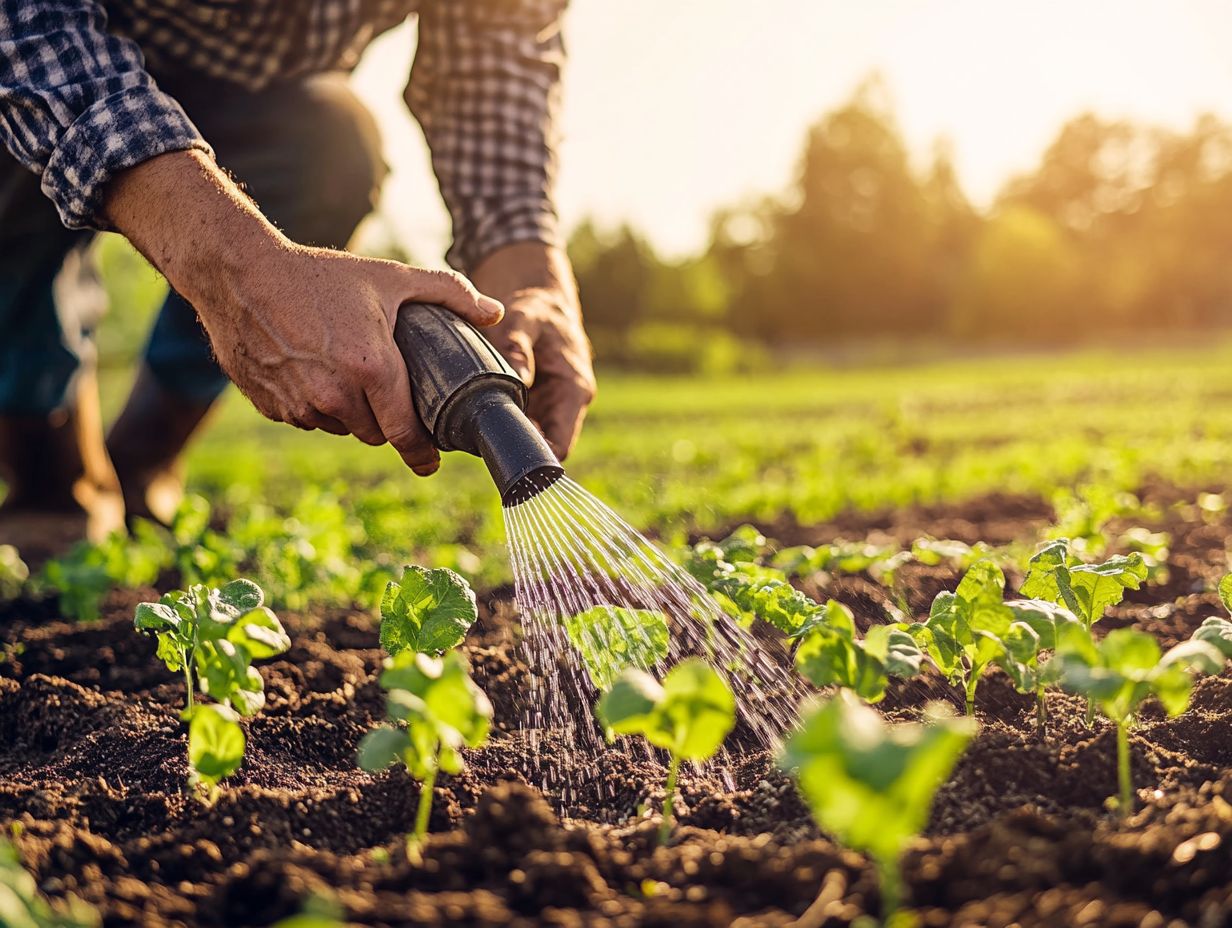
Water conservation helps farmers reduce their costs by using less water. This leads to savings in energy, labor, and equipment. It also increases crop yields, improves soil quality, and reduces the risk of drought.
What are some water conservation techniques used in agriculture?
Some water conservation techniques used in agriculture include drip irrigation, rainwater harvesting, crop rotation, and mulching. These methods help farmers use water more efficiently and sustainably.
How can water conservation in agriculture impact the environment?
Water conservation in agriculture can have a positive impact on the environment by reducing water pollution, preserving wildlife habitats, and maintaining the balance of ecosystems. It also helps mitigate the effects of climate change.
Start your water conservation journey now for a sustainable future!
What are the challenges of implementing water conservation in agriculture?
Implementing water conservation in agriculture is often costly. Farmers face high expenses when installing new equipment or adopting new techniques.
Many farmers also struggle with limited access to technology and knowledge, making implementation even harder.
What can individuals do to support water conservation in agriculture?
Individuals can make a difference by buying products grown with sustainable practices. Reducing food waste and conserving water in everyday life is crucial, too.
Support policies and initiatives that encourage water conservation in agriculture. Every choice counts!





